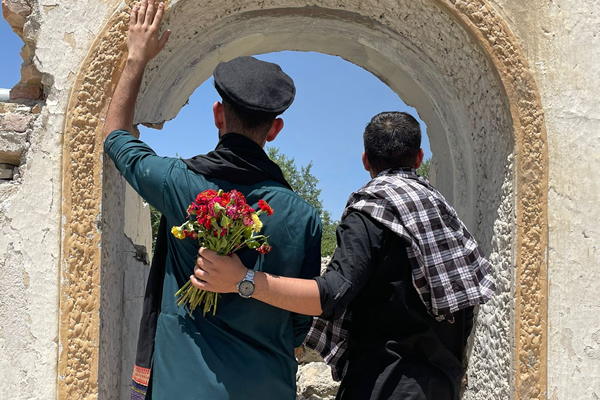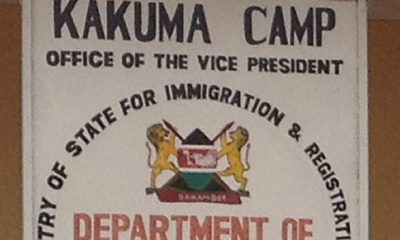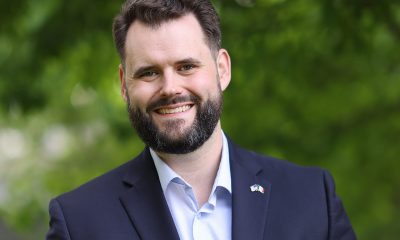World
Efforts to evacuate LGBTQ Afghans to continue after US troop withdrawal
Taliban entered Kabul on Aug. 15

The last American troops have withdrawn from Afghanistan amid continued efforts to evacuate LGBTQ people from the country.
Marine Corps Gen. Kenneth McKenzie, the commander of U.S. Central Command told reporters on Monday the last American C-17 left Hamid Karzai International Airport in Kabul, the Afghan capital, at 3:29 p.m. ET (11:59 p.m. in Afghanistan.)
“Tonight’s withdrawal signifies both the end of the military component of the evacuation but also the end of the nearly 20-year mission that began in Afghanistan shortly after September 11, 2001,” said McKenzie.
The previous White House in 2020 brokered a peace deal with the Taliban that set the stage for the withdrawal. President Biden last month announced American military operations in Afghanistan would end on Tuesday.
The Taliban entered Kabul on Aug. 15 and toppled then-President Ashraf Ghani’s government.
McKenzie and Secretary of State Antony Blinken on Monday noted the U.S. evacuated more than 123,000 people — including 6,000 American citizens — from Afghanistan since the Taliban regained control of the country.
“This has been a massive military, diplomatic and humanitarian undertaking — one of the most difficult in our nation’s history — and an extraordinary feat of logistics and coordination under some of the most challenging circumstances imaginable,” said Blinken in remarks he delivered from the State Department.
Blinken acknowledged “a small number of Americans — under 200 and likely closer to 100 — who remain in Afghanistan and want to leave.” Blinken in his remarks did not specifically mention LGBTQ Afghans who remain in the country, but he did refer to “at-risk Afghans” when he referenced the Taliban’s commitment “to let anyone with proper documents leave the country in a safe and orderly manner.”
“We are all committed to ensuring that our citizens, nationals and residents, employees, Afghans who have worked with us and those who are at risk can continue to travel freely to destinations outside Afghanistan,” reads a statement the U.S. and more than 100 other countries signed on Sunday. “We have received assurances from the Taliban that all foreign nationals and any Afghan citizen with travel authorization from our countries will be allowed to proceed in a safe and orderly manner to points of departure and travel outside the country.”
“We will continue issuing travel documentation to designated Afghans, and we have the clear expectation of and commitment from the Taliban that they can travel to our respective countries,” adds the statement. “We note the public statements of the Taliban confirming this understanding.”
Blinken in his remarks noted the U.N. Security Council on Monday “passed a resolution that enshrines that responsibility — laying the groundwork to hold the Taliban accountable if they renege.”
“The international chorus on this is strong, and it will stay strong,” said Blinken. “We will hold the Taliban to their commitment on freedom of movement for foreign nationals, visa holders, at-risk Afghans.”
“We will work to secure their safe passage,” added Blinken.
Taliban ‘will kill us one by one’
The Taliban instituted a strict version of Sharia law in Kabul and the large swaths of Afghanistan it controlled from 1996 to 2001.
Dr. Ahmad Qais Munhazim, an assistant professor of global studies at Thomas Jefferson University in Philadelphia who is originally from Afghanistan, in an op-ed the Washington Blade published earlier this month wrote the Taliban hanged men in soccer fields who had been accused of having same-sex relationships.
A Taliban judge last month said the group would once again execute people if it were to return to power in Afghanistan. One LGBTQ Afghan who commented under a Facebook post said the Taliban “will kill us one by one, so I have no choice but to escape.”
More than 60 members of Congress last week urged the U.S. to evacuate LGBTQ Afghans from their country. Canada thus far is the only country that has specifically said it would offer refuge to LGBTQ Afghans.
“With the Taliban’s takeover of the country, LGBTQ+ Afghans face the prospect of violent death. Sharia law, cemented in Afghanistan’s constitution, prohibits all forms of same-sex activity, and makes same-sex activity punishable by death,” reads the letter the members of Congress sent to Blinken. “Just as it was for ISIS in Iraq, Sharia law is the Taliban’s guiding compass as it establishes its rule over Afghanistan’s government and society. During its campaign in Iraq and Syria, ISIS frequently executed LGBTQ+ individuals by stoning them to death, castrating and hanging them in public squares, and throwing them off buildings.”
“Under Taliban rule, LGBTQ+ Afghans will suffer a similar fate,” it adds.
Nick Herbert, a member of the British House of Lords who advises Prime Minister Boris Johnson on LGBTQ issues, urged the U.K. to offer sanctuary to LGBTQ Afghans.
“The safety of LGBT+ people in Afghanistan is now a huge concern and many have not been able to leave,” tweeted Herbert on Aug. 27. “Afghans most in need, including LGBT+ people, will rightly be prioritized and welcomed to the UK under the Resettlement Scheme. We must do everything we can to help them.”
The safety of LGBT+ people in Afghanistan is now a huge concern and many have not been able to leave. Afghans most in need, including LGBT+ people, will rightly be prioritised and welcomed to the UK under the Resettlement Scheme. We must do everything we can to help them.
— Nick Herbert (@nickherbertcbe) August 27, 2021
Rainbow Railroad, a Toronto-based organization that assists LGBTQ refugees around the world, on Monday said it remains in contact with LGBTQ Afghans who hope to leave their country. Stonewall, a British LGBTQ rights group, tweeted it “won’t stop working to get LGBTQ+ Afghans to safety.”
Rainbow Railroad continues to liaise with #LGBTQI people on the ground in #Afghanistan. @KimahliPowell updated @CBCToronto and @chrisgloverCBC on our efforts to find safety for people caught in this conflict. https://t.co/ewP818TZYD
— Rainbow Railroad (@RainbowRailroad) August 30, 2021
Congress
McBride, other US lawmakers travel to Denmark
Trump’s demand for Greenland’s annexation overshadowed trip

Delaware Congresswoman Sarah McBride is among the 11 members of Congress who traveled to Denmark over the past weekend amid President Donald Trump’s continued calls for the U.S. to take control of Greenland.
McBride, the first openly transgender person elected to Congress, traveled to Copenhagen, the Danish capital, with U.S. Sens. Chris Coons (D-Del.), Thom Tillis (R-N.C.), Jeanne Shaheen (D-N.H.), Dick Durbin (D-Ill.), and Lisa Murkowski (R-Alaska) and U.S. Reps. Steny Hoyer (D-Md.), Gregory Meeks (D-N.Y.), Madeleine Dean (D-Pa.), Don Bacon (R-Neb.), and Sarah Jacobs (D-Calif.). The lawmakers met with Danish Prime Minister Mette Frederiksen and Greenlandic MP Pipaluk Lynge, among others.
“I’m grateful to Sen. Coons for his leadership in bringing together a bipartisan, bicameral delegation to reaffirm our support in Congress for our NATO ally, Denmark,” said McBride in a press release that detailed the trip. “Delaware understands that our security and prosperity depend on strong partnerships rooted in mutual respect, sovereignty, and self-determination. At a time of growing global instability, this trip could not be more poignant.”
Greenland is a self-governing territory of Denmark with a population of less than 60,000 people. Trump maintains the U.S. needs to control the mineral-rich island in the Arctic Ocean between Europe and North America because of national security.
The Associated Press notes thousands of people on Saturday in Nuuk, the Greenlandic capital, protested against Trump. British Prime Minister Keir Starmer is among those who have criticized Trump over his suggestion the U.S. would impose tariffs against countries that do not support U.S. annexation of Greenland.
A poll that Sermitsiaq, a Greenlandic newspaper, and Berlingske, a Danish newspaper, commissioned last January indicates 85 percent do not want Greenland to become part of the U.S. The pro-independence Demokraatit party won parliamentary elections that took place on March 12, 2025.
“At this critical juncture for our countries, our message was clear as members of Congress: we value the U.S.-Denmark partnership, the NATO alliance, and the right of Greenlanders to self-determination,” said McBride on Sunday in a Facebook post that contained pictures of her and her fellow lawmakers meeting with their Danish and Greenlandic counterparts.
Colombia
Gay Venezuelan opposition leader: Country’s future uncertain after Maduro ouster
Yendri Rodríguez fled to Colombia in 2024 after authorities ‘arbitrarily detained’ him

A gay Venezuelan opposition leader who currently lives in Colombia says his country’s future is uncertain in the wake of now former President Nicolás Maduro’s ouster.
The Washington Blade spoke with Yendri Rodríguez on Thursday, 12 days after American forces seized Maduro and his wife, Cilia Flores, at their home in Caracas, the Venezuelan capital, during an overnight operation.
Maduro and Flores on Jan. 5 pleaded not guilty to federal drug charges in New York. The Venezuelan National Assembly the day before swore in Delcy Rodríguez, who was Maduro’s vice president, as the country’s acting president.
Rodríguez, who lives in the Colombian capital of Bogotá, described the events surrounding Maduro’s ouster as “very confusing.”
“It was a very surprising thing that left me in shock,” Rodríguez told the Blade. “We also thought, at least from the perspective of human rights, that the United States was going to respect international law and not go to the extreme of bombing and extracting Maduro.”
“Other questions also arise,” he added. “What could have been done? What else could have been done to avoid reaching this point? That is the biggest question posed to the international community, to other countries, to the human rights mechanisms we established before Trump violated international law, precisely to preserve these mechanisms and protect the human rights of Venezuelan people and those of us who have been forced to flee.”
Rodríguez three years ago founded the Venezuelan Observatory of LGBTIQ+ Violence. He also worked with Tamara Adrián, a lawyer who in 2015 became the first openly transgender woman elected to the Venezuelan National Assembly, for more than a decade.
Members of Venezuela’s military counterintelligence agency, known by the Spanish acronym DGCIM, on Aug. 3, 2024, “arbitrarily detained” Rodríguez as he was trying to leave the country to attend a U.N. human rights event in Geneva.
Rodríguez told the Blade he was “forcibly disappeared” for nearly nine hours and suffered “psychological torture.” He fled to Colombia upon his release.
Two men on Oct. 14, 2025, shot Rodríguez and Luis Peche Arteaga, a Venezuelan political consultant, as they left a Bogotá building.
The assailants shot Rodríguez eight times, leaving him with a fractured arm and hip. Rodríguez told the Blade he has undergone multiple surgeries and has had to learn how to walk again.
“This recovery has been quite fast, better than we expected, but I still need to finish the healing process for a fractured arm and complete the physical therapy for the hip replacement I had to undergo as a result of these gunshots,” he said.

María Corina Machado, who won the 2025 Nobel Peace Prize, and other Venezuelan opposition leaders said Maduro’s government targeted Rodríguez and Peche. Colombian President Gustavo Petro and his government also condemned the attack.
Colombian authorities have yet to arrest anyone in connection with the attack.
Rodríguez noted to the Blade he couldn’t sleep on Jan. 3 because “of the aches and pains” from the shooting. He said a friend who is “helping me out and looking after my things” was the one who told him about the operation the U.S. carried out to seize Maduro and Flores.
“He said, ‘Look at this! They’re bombing Caracas! And I was like, ‘What is this?'” recalled Rodríguez.
White House ‘not necessarily’ promoting human rights agenda
Rodríguez noted Delcy Rodríguez “is and forms part of the mechanisms of repression” that includes DGCIM and other “repressive state forces that have not only repressed, but also tortured, imprisoned, and disappeared people simply for defending the right to vote in (the) 2024 (election), simply for protesting, simply for accompanying family members.” Yendri Rodríguez told the Blade that “there isn’t much hope that things will change” in Venezuela with Delcy Rodríguez as president.
“Let’s hope that countries and the international community can establish the necessary dialogues, with the necessary intervention and pressure, diplomatically, with this interim government,” said Yendri Rodríguez, who noted hundreds of political prisoners remain in custody.
He told the Blade the Trump-Vance administration does not “not necessarily” have “an agenda committed to human rights. And we’ve seen this in their actions domestically, but also in their dealings with other countries.”
“Our hope is that the rest of the international community, more than the U.S. government, will take action,” said Yendri Rodríguez. “This is a crucial moment to preserve democratic institutions worldwide, to preserve human rights.”
Yendri Rodríguez specifically urged the European Union, Colombia, Brazil, and other Latin American countries “to stop turning a blind eye to what is happening and to establish bridges and channels of communication that guarantee a human rights agenda” and to try “to curb the military advances that the United States may still be considering.”

Yendri Rodríguez told the Blade he also plans to return to Venezuela when it is safe for him to do so.
“My plan will always be to return to Venezuela, at least when it’s no longer a risk,” he said. “The conditions aren’t right for me to return because this interim government is a continuation of Maduro’s government.”
Editor’s note: International News Editor Michael K. Lavers was on assignment in Bogotá, Colombia, from Jan. 5-10.
Iran
Grenell: ‘Real hope’ for gay rights in Iran as result of nationwide protests
Former ambassador to Germany claimed he has sneaked ‘gays and lesbians out of’ country

Richard Grenell, the presidential envoy for special missions of the United States, said on X on Tuesday that he has helped “sneak gays and lesbians out of Iran” and is seeing a change in attitudes in the country.
The post, which now has more than 25,000 likes since its uploading, claims that attitudes toward gays and lesbians are shifting amid massive economic protests across the country.
“For the first time EVER, someone has said ‘I want to wait just a bit,” the former U.S. ambassador to Germany wrote. “There is real hope coming from the inside. I don’t think you can stop this now.”

Grenell has been a longtime supporter of the president.
“Richard Grenell is a fabulous person, A STAR,” Trump posted on Truth Social days before his official appointment to the ambassador role. “He will be someplace, high up! DJT”
Iran, which is experiencing demonstrations across all 31 provinces of the country — including in Tehran, the capital — started as a result of a financial crisis causing the collapse of its national currency. Time magazine credits this uprising after the U.N. re-imposed sanctions in September over the country’s pursuit of nuclear weapons.
As basic necessities like bread, rice, meat, and medical supplies become increasingly unaffordable to the majority of the more than 90 million people living there, citizens took to the streets to push back against Iran’s theocratic regime.
Grenell, who was made president and executive director of the John F. Kennedy Center for the Performing Arts last year by Trump, believes that people in the majority Shiite Muslim country are also beginning to protest human rights abuses.
Iran is among only a handful of countries in which consensual same-sex sexual relations remain punishable by death, according to the Death Penalty Information Center.




















